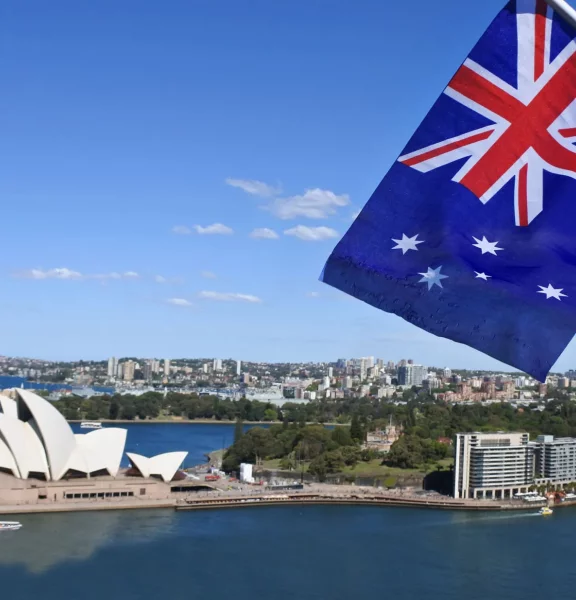Get your own personalized 360° MBA Ranking now.
Get a free consultation

International MBA students
Student satisfaction rate
Schools accredited by AACSB, AMBA or EQUIS
Average annual salary
Your guide to studying in Australia
Australia boasts world-renowned business schools and a rich multicultural environment, making it a top destination for international students. With a strong emphasis on practical learning, Australian universities offer a wide range of programs designed to equip students with the skills needed in the global job market. Beyond academics, Australia’s high standard of living, safe cities, and stunning natural landscapes provide an unparalleled lifestyle experience. Students can enjoy a dynamic cultural scene, vibrant city life, and numerous outdoor activities, all while building a global network.
Cultural Specifics of Australia
Australia’s culture is characterized by its laid-back and friendly demeanor, emphasizing respect and equality. Etiquette is important, with politeness and punctuality valued highly in both personal and professional interactions. Communication tends to be direct and informal, reflecting the Australian preference for straightforwardness and honesty. Australians value egalitarianism, where everyone is considered equal, and there is a strong emphasis on fair treatment and opportunity for all.
Customs such as greeting with a firm handshake, maintaining eye contact, and using first names early in relationships reflect the country’s open and approachable nature. Additionally, Australians enjoy a vibrant outdoor lifestyle, often engaging in activities like barbecues, sports, and beach outings, which are central to social life. Understanding these cultural specifics can enhance your experience and integration into Australian society.
Business Culture in Australia
Direct communication, an egalitarian approach, and an emphasis on efficiency and punctuality are some of the typical aspects of Australia’s business culture. Meetings are often straightforward and to the point, with a preference for clear and honest communication, reflecting the value placed on transparency and directness. Business practices emphasize mutual respect and equality, with decision-making often being collaborative and consensus-driven. Networking and relationship-building are important, and Australians value trust and reliability in their business dealings.
Additionally, punctuality is highly regarded, so being on time for meetings is essential. The dress code in Australian business settings is typically smart casual, although some industries, particularly creative and tech sectors, may adopt even more casual attire. Suits and ties for men and professional dresses or suits for women are often reserved for formal occasions.
The experiences of students and alumni in Australia
Business school culture, an increasingly important factor in the MBA selection process, can now be measured with growing precision.
Do you need an MBA coaching session? Would you like to hear advice directly from MBA alumni? Here is how you can get those opportunities, for free.
Advantages of the MBA programs in Australia
The latest Financial Times MBA and EMBA rankings list 3 Australian schools among the top in the world, recognizing their strategic locations and the significant advantages in networking and career opportunities they provide. Of the only 129 schools globally that hold the coveted Triple Crown accreditation, 3 universities in Australia are accredited by AACSB, EQUIS, and AMBA – a marker of high educational standards and international credibility.
Australian universities offer numerous scholarships and financial aid options to attract international students, easing the financial burden of pursuing an MBA. Prestigious scholarships such as the Australia Awards and university-specific grants provide significant financial support based on academic merit and need.
Australia’s robust economy and focus on innovation provide a dynamic environment for career growth and entrepreneurship. Studying an MBA in Australia opens up extensive professional opportunities, as the country hosts many multinational companies and thriving industries. Graduates benefit from strong industry links and networking events that enhance their career prospects.
COMMON EXPENSES AND LEGAL ASPECTS
Cost of living
Rent of one-bedroom apartment in city center (monthly): AUD 2,224.70
Basic utilities (monthly): AUD 307.84
Public transport pass (monthly): 168.00
Gym subscription (monthly): AUD 78.01
Water (1.5-liter bottle): AUD 2.55
Source: Numbeo
Visa requirements and work permits
To study an MBA in Australia, you need to apply for a subclass 500 student visa, which allows full-time study in a registered course. The application process requires proof of enrollment (Confirmation of Enrollment or CoE), evidence of sufficient funds, English language proficiency, and Overseas Student Health Cover (OSHC). The visa also permits students to work up to 48 hours per fortnight during academic sessions and unlimited hours during scheduled course breaks. Upon completion of their studies, graduates may be eligible for different types of Temporary Graduate visas (subclass 485), which allow them to work in Australia for a limited time, depending on their qualifications.
FEATURED SCHOOLS IN Australia



Available programs:
Explore the most popular MBA programs in Australia
You might also be interested in...
Request a consultation
Get a free consultation with our expert advisors and discover the MBA that best suits your profile and aspirations.

